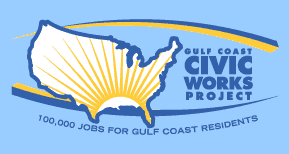
The H.R. 4048: Gulf Coast Civic Works Act was sponsored by Rep. Zoe Lofgren [D-CA16] and introduced into the 110th Congress of 2007-2008, although it was never called for a vote. The goal of the Act as stated to Congress is: "To establish the Gulf Coast Recovery Authority to administer a Gulf Coast Civic Works Project to provide job-training opportunities and increase employment to aid in the recovery of the Gulf Coast region" (http://www.govtrack.us/congress/bill.xpd?bill=h110-4048).
The folks at the Katrina Information Network are pushing for the bill to:
The folks at the Katrina Information Network are pushing for the bill to:
- Rebuild and repair vital infrastructure, including schools, police and fire stations, hospitals, parks, roads, water and sewer systems, workforce housing, and cultural centers
- Rebuild natural flood protection such as barrier island, marshes, and wetlands
- Create good green jobs and provides job training
- Appoint a Gulf Coast Recovery Coordinator to the Office of the President with a charge to speed recovery programs so that people can move home to new opportunity
Fill the funding gaps for home repair and rebuilding so people can afford to move home to recovered neighborhoods
The Gulf Coast Civic Works Project (GCCWP) is the national student movement to pass the Gulf Coast Civic Works Act, a federal bill with which they hope to create 100,000 jobs for Gulf Coast residents and evacuees to rebuild their public infrastructure. The GCCWP is working in coalition with community, faith-based, and human rights organizations to pass the Act. You can find out more information about the movement behind the bill at http://www.solvingpoverty.com/
Because the problems facing New Orleans pre-date the catastrophic events of the Hurricane season 2005, the rebuilding of the city has been plagued with a number of social and political set-backs. One of the major urban challenges to rebuilding the Gulf Coast post-Katrina has been the political climate.
George Lipsitz (2006)*** argues that a hostile political climate has predominated ever since the social movements of the 1960s and 1970s challenged the American white supremacist status quo. Because of this new era of conservatism, he writes, a new social warrant of “competitive consumer citizenship” emerged in which each individual was forced to fend for herself. It was this “organized abandonment of poor and working class Black people in New Orleans prior to the hurricane” (24) that produced the conditions of possibility for the disaster that was to unfold after Katrina and Rita breached the levies and flooded the city.
Stephen Graham (Understanding Katrina 2006) also illustrates how the war on crime and the war on drugs in particular ended up producing a war on cities across the nation. He indicts the protection of the ex-urban American lifestyle and its voracious consumption of energy (for which he argues the Iraq war was waged) as well as its furious denial of global warming and climate change, as the reason for which U.S. government priorities were in Iraq instead of New Orleans at the time of the storm. On the other hand, D. Strolovitch, D. Warren, and P. Frymer (Understanding Katrina 2006) see anti-federalist backlash as at the root of weakening governmental capacities. The authors assert that debates about federalism and states’ rights tend to act as smokescreens for powerful elites to discriminate against and do violence to Black people and other politically subversive, marginalized communities. Although the political climate has changed somewhat since the election of Barack Obama, only 4.4% of the federal stimulus money allocated to LA has gone towards housing, and 2.3% to human services (http://www.stimulus.la.gov/).
*** Lipsitz, George. "Learning from New Orleans: The Social Warrant of Hostile Privatism and Competitive Consumer Citizenship." Cultural Anthropology. Volume 21. Issue 3. August 2006 (Pages 451 - 468)
Because the problems facing New Orleans pre-date the catastrophic events of the Hurricane season 2005, the rebuilding of the city has been plagued with a number of social and political set-backs. One of the major urban challenges to rebuilding the Gulf Coast post-Katrina has been the political climate.
George Lipsitz (2006)*** argues that a hostile political climate has predominated ever since the social movements of the 1960s and 1970s challenged the American white supremacist status quo. Because of this new era of conservatism, he writes, a new social warrant of “competitive consumer citizenship” emerged in which each individual was forced to fend for herself. It was this “organized abandonment of poor and working class Black people in New Orleans prior to the hurricane” (24) that produced the conditions of possibility for the disaster that was to unfold after Katrina and Rita breached the levies and flooded the city.
Stephen Graham (Understanding Katrina 2006) also illustrates how the war on crime and the war on drugs in particular ended up producing a war on cities across the nation. He indicts the protection of the ex-urban American lifestyle and its voracious consumption of energy (for which he argues the Iraq war was waged) as well as its furious denial of global warming and climate change, as the reason for which U.S. government priorities were in Iraq instead of New Orleans at the time of the storm. On the other hand, D. Strolovitch, D. Warren, and P. Frymer (Understanding Katrina 2006) see anti-federalist backlash as at the root of weakening governmental capacities. The authors assert that debates about federalism and states’ rights tend to act as smokescreens for powerful elites to discriminate against and do violence to Black people and other politically subversive, marginalized communities. Although the political climate has changed somewhat since the election of Barack Obama, only 4.4% of the federal stimulus money allocated to LA has gone towards housing, and 2.3% to human services (http://www.stimulus.la.gov/).
*** Lipsitz, George. "Learning from New Orleans: The Social Warrant of Hostile Privatism and Competitive Consumer Citizenship." Cultural Anthropology. Volume 21. Issue 3. August 2006 (Pages 451 - 468)
Ronni ARMSTEAD
No comments:
Post a Comment